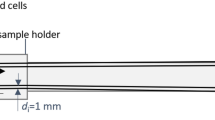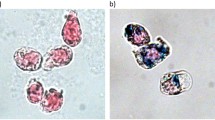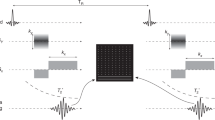Abstract
Previous studies have used magnetic particles to estimate the viscosity of cell cytoplasm in vitro1–4. Here we describe how magnetic Fe2O3 particles can be used to estimate non-invasively the motion of organelles in hepatic macrophages in intact animals. We report that when these particles are injected intravenously (i.v.), most are phagocytosed by hepatic macrophages (Fig. 1)5. When an external magnetic field is applied to the rabbit, these particles become magnetized and aligned. After removal of the field, the particles collectively produce a remanent magnetic field which can be measured at the body surface. This field decreases with time due to particle rotation (relaxation)6,7. As the particles are contained in phagosomes or secondary lysosomes, we conclude that motions of these organelles are responsible for the particle rotation and relaxation.
This is a preview of subscription content, access via your institution
Access options
Subscribe to this journal
Receive 51 print issues and online access
$199.00 per year
only $3.90 per issue
Buy this article
- Purchase on Springer Link
- Instant access to full article PDF
Prices may be subject to local taxes which are calculated during checkout
Similar content being viewed by others
References
Heilbronn, A. L. Jber. wiss. Bot. 61, 284–338 (1922).
Crick, F. H. C. & Hughes, A. F. W. Expl Cell Res. 1, 37–80 (1950).
Yagi, K. Expl Biochem. Physiol. 3, 73–91 (1961).
Hiramoto, Y. Symp. Soc. exp. Biol. 22, 311–327 (1968).
Hampton, J. C. Acta anat. 32, 262–291 (1958).
Cohen, D. Science 180, 745–748 (1973).
Cohen, D. Natn. tech. Inf. Serv. MIT/FBNML-78/1 (1978).
Valberg, P. A. & Brain, J. D. Am. Rev. resp. Dis. 120, 1013–1024 (1979).
Cohen, D., Nemoto, I., Kaufman, L. & Arai, S. F. IEEE Biomed. Engng (submitted).
Cohen, D., Arai, S. & Brain, J. D. Science 204, 514–517 (1979).
Halpern, M., Williamson, S. J., Spektor, D. M., Schlesinger, R. B. & Lippmann, M. Expl Lung Res. 2, 27–35 (1981).
Brain, J. D. & Valberg, P. A. Am. Rev. resp. Dis. 120, 1325–1373 (1979).
Aguas, A. P. J. ultrastruct. Res. 74, 175–182 (1981).
Moore, P. L., Bank, H. L., Brissie, N. T. & Spicer, S. S. J. Cell Biol. 71, 659–666 (1976).
Wolosewick, J. J. & Porter, K. R. J. Cell Biol. 82, 114–139 (1979).
Luby, K. J. & Porter, K. R. Cell 21, 13–23 (1980).
Rebhun, L. J. in Primitive Motile Systems in Cell Biology (eds Allen, R. D. & Kamiya, N.) 503–525 (Academic, New York, 1964).
Taylor, D. L. & Condeelis, J. S. Int. Rev. Cytol. 56, 57–144 (1979).
Temmink, J. H. M. & Spiele, J. J. Cell Sci. 41, 19–32 (1980).
Author information
Authors and Affiliations
Rights and permissions
About this article
Cite this article
Gehr, P., Brain, J., Bloom, S. et al. Magnetic particles in the liver: a probe for intracellular movement. Nature 302, 336–338 (1983). https://doi.org/10.1038/302336a0
Received:
Accepted:
Issue Date:
DOI: https://doi.org/10.1038/302336a0
This article is cited by
-
Ultrafine particles cause cytoskeletal dysfunctions in macrophages: role of intracellular calcium
Particle and Fibre Toxicology (2005)
-
Probing the analogy of the proton relaxation in biological tissues and porous media
Il Nuovo Cimento D (1993)
-
Behaviour of magnetic micro-particles in the human lung
Radiation and Environmental Biophysics (1993)
Comments
By submitting a comment you agree to abide by our Terms and Community Guidelines. If you find something abusive or that does not comply with our terms or guidelines please flag it as inappropriate.



